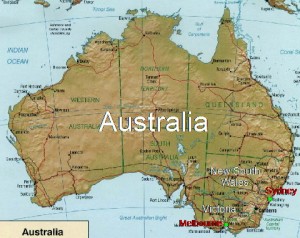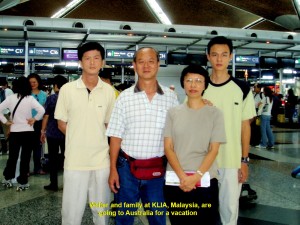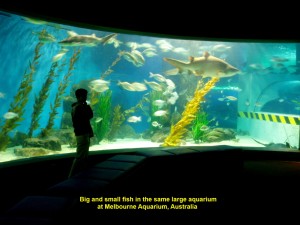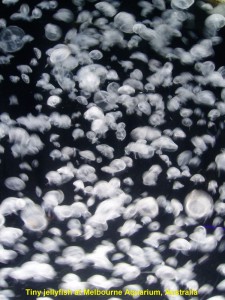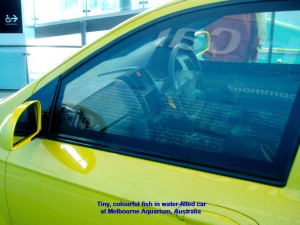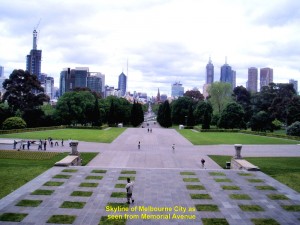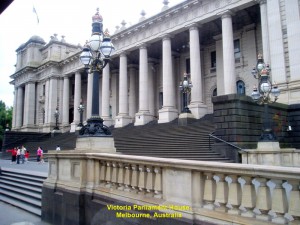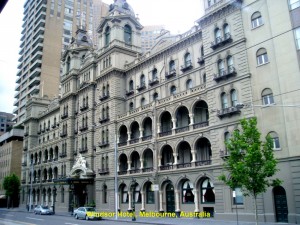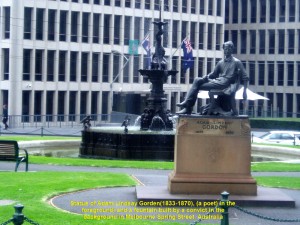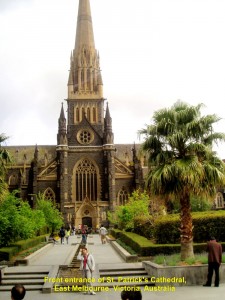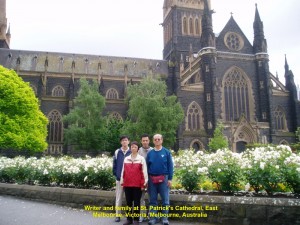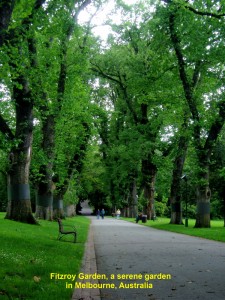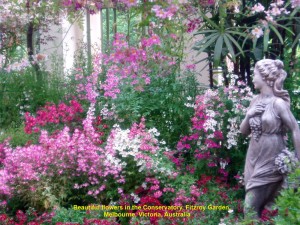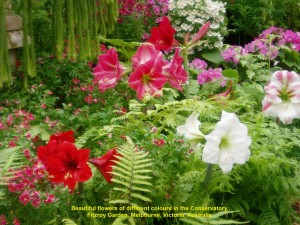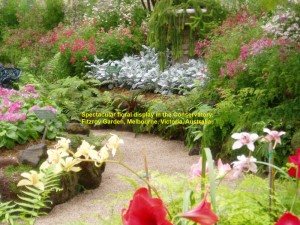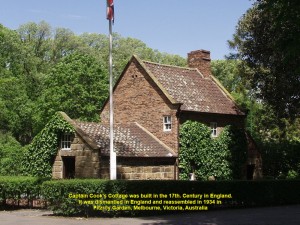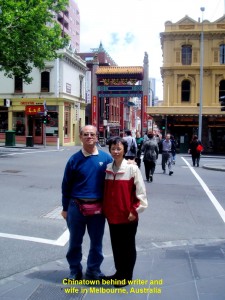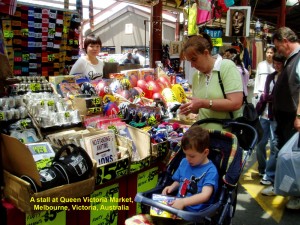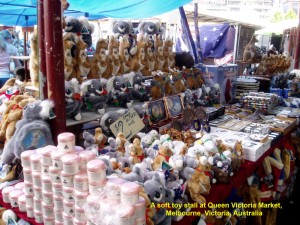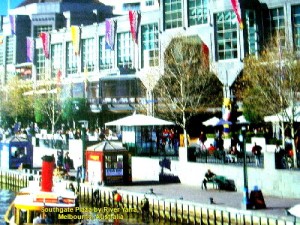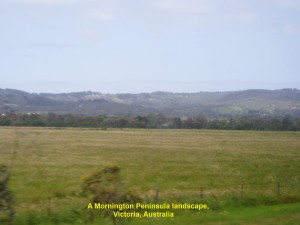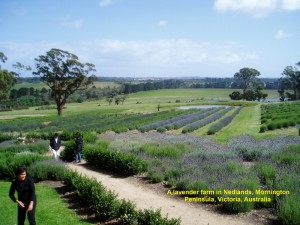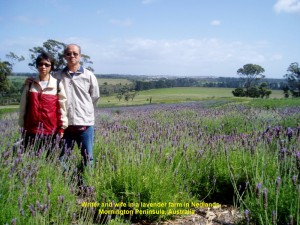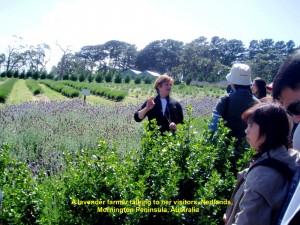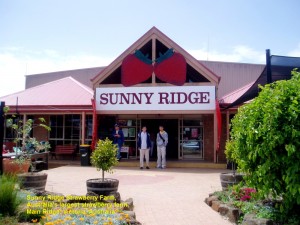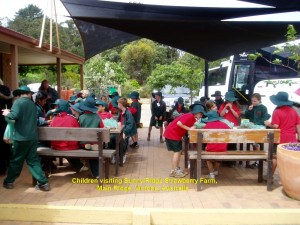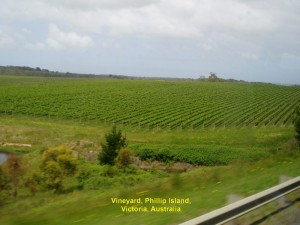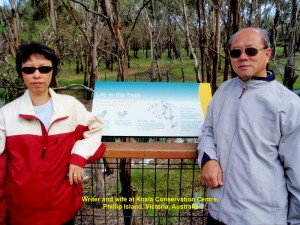Australia Travel (Part I)
Australia Travel Part I
After enjoying a tour of six countries in Europe in June 2004, my wife and I were bitten by the travelling bug again. This time we decided to travel to two Australian cities, Melbourne and Sydney, for another exciting sightseeing tour. For this travel, we got our two sons to come along with us to enjoy the travelling experience together.
Below is the itinerary of our Australia travel:
Day 1 Air Travel to Australia
Day 2 Melbourne Aquarium
Melbourne City Tour 1
Melbourne City Tour 2
Day 3 Mornington Peninsula
Phillip Island
Day 4 Sydney City Tour 1
Sydney City Tour 2
Day 5 Sydney Koala Park Sanctuary
Blue Mountains
Day 6 Queen Victoria Building
Day 7 Journey Home (Malaysia)
(by Choo Chaw, Kluang, Johor, Malaysia)
Day 1: Friday 12 Nov 2004 Air Travel To Australia
On 12 Nov 2004, we joined a group of 20 Malaysian tourists at Kuala Lumpur International Airport (KLIA). In the evening we boarded an airplane, Boeing 737.
Boeing 747 of Qantas Soon we were flying in the air and not long we landed at Changi International Airport in Singapore where we boarded another airplane, Boeing 747. When I entered the airplane, I was amazed to see the plane bigger than the earlier one we had taken. It was wider. Besides, it had many rows of seats and a staircase leading to another floor. Out of curiosity, I explored the plane inside and quietly told myself that airplane builders were fantastic. Besides its own weight, the plane could carry more than 300 passengers!
Soon, in the evening, we were flying again and continued our long journey to Australia.
Day 2: Saturday 13 Nov 2004 Melbourne Aquarium
After travelling in the air for 8 hours, we finally arrived at Melbourne airport in the morning. Then we were whisked away by a coach to the Melbourne Aquarium located on the corner off Queensland Road and King Street, and near Yarra River. The river at that moment was swollen as it had rained heavily in the interior.
The aquarium shows more than 10,000 marine creatures ranging from tiny jelly fish to huge sting-rays and white sharks. Besides, it carries out a shark conservation project.
When we came out of the aquarium, we were fascinated by a small, yellow car which was completely filled with water and tiny, colourful fish were seen swimming inside. Then we headed to the city for a sightseeing tour.
Melbourne City
Melbourne is the 2nd. largest city in Australia. It has a population of 3.4 million who are mostly Europeans.
Among the interesting places we visited were as follows:
Parliament House of Victoria in Spring Street
It was built in 1856 and became the seat of Federal Parliament until 1927 when Canberra became the official capital of Australia. Then it was taken over by the Victoria State Parliament.
Windsor Hotel
It is one of the oldest hotels in Melbourne. It is a grand old hotel of four storeys and built in Victorian architectural style.
Adam Lindsay Gordon
In the city, there is a beautiful fountain which was built by a convict. In front of the fountain is a statue of a famous Australian poet, Adam Lindsay Gordon (1833-1870). Famous lines in one of his poems are:
“Question not, but live and labour
Till yon goal be won,
Helping every feeble neighbour,
Life is mostly froth and bubble,
Two things stand like stone,
KINDNESS in another’s trouble,
COURAGE in your own.”
St. Patrick’s Cathedral
It is located in Cnr. Grisborne Street. It was officially opened in 1858 and is regarded as the finest ecclesiastical building in Australia. It is built in Gothic architectural style and its main spire is 105 metres high. It is large with a seating capacity of 1,800 – 2,000.
Fitzroy Garden
It is near St. Patrick’s Cathedral. It is a magnificent garden which has both big native trees like Bunya Bunya Pine, Flame Tree, Spotted Gum, Moreton Bay Fig, and exotic trees like Cape Chestnut, Tulip Tree, Linden, English Elm and Maidenhair Tree. Attractive statues can be seen in the garden, such as Boy on the Turtle, Boy and Pelican, Diana and the Hounds, Mermaid and Fish, and Statue of Meditation.
Besides, there is a beautiful beige-coloured building built in the Spanish mission architectural style, the Conservatory. It is a tourist favourite attraction as it has a spectacular myriad of floral displays, e.g. colourful flowers of schizanthus, calceolaria hydrangea, fuchsia, tuberous begonia and gloxinia.
Captain Cook’s Cottage
It is in Fitzroy Garden. It is a small two-storey building made of sandstone and bricks surrounded by a garden of 18th. Century character. Originally, the cottage was built in Yorkshire, England and in 1755 Captain James Cook’s father bought it. Captain Cook had stayed in it during his boyhood days. In 1933, a prominent Melbournian, Russel Grumwide, bought it as a gift to the people of Victoria. It was dismantled in England and transported to Fitzroy Garden in Melbourne where it was reassembled in 1934.
Sinclair’s Cottage
It is a small, old brick-house in Fitzroy Garden. It was built in 1864 and is on the main walkway. James Sinclair who was a well-known plant artist had lived in the cottage. He had worked for the Parks Lands Committee of Fitzroy Square and introduced many kinds of plants in the garden. He died at the age of 72 in 1881 in his cottage.
Shrine of Remembrance and War Memorial
They are sited near St. Patrick’s Cathedral. The former is modelled on the ancient Greek Parthenon and was completed in 1934 to honour the 114,000 Victorians who had served in WW 1, of whom 19,000 died.
At the end of WW II, more than 250,000 Melbournians attended the ceremony to commemorate the ending of WW II. The War Memorial was built in memory of the fallen Australian heroes in World World II.
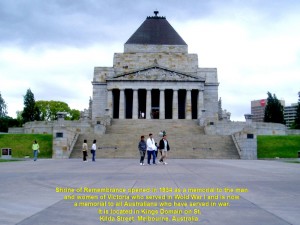
Shrine of Remembrance opened in 1934 to memorial of men and women of Victoria who served in WWW I, Melbourne, Victoria, Australia
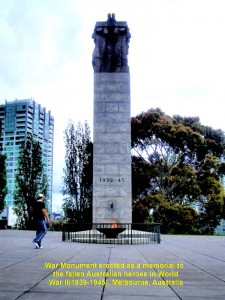
War Memorial erected to memorial of fallen Australian heroes in WWW II(1939-1945), Melbourne, Victoria, Australia
Chinatown
It is a bustling, colourful area. It has a characteristic Chinese arch at its entrance. It is packed with traditionally-run Chinese shops and restaurants in and around Little Bourke Street.
Queen Victoria Market
It is located in Elizabeth Street. It was opened in 1878 and covers an area of 5.5 hectares. It houses hundreds of stalls which offer goods ranging from souvenirs and clothes to carpets and watches. Besides, fruits, flowers and seafoods are also sold here. Browsing the stalls is a pleasurable and unforgettable experience.
Town Hall
It is in Swanston Street. It was built in 1870 and its tall tower holds a big clock which is still working. Decisions concerning the city’s development are made here. It is also an important hub for the city’s cultural and civic activities. In addition, it plays host to theatrical performances, weddings, receptions and exhibitions.
Southgate Plaza
After the city tour, we checked in at a hotel. In the evening, we went to Southgate Plaza along River Yarra which is a popular spot for tourists and locals alike. It has a casino (Crown Casino), fine restaurants, bars, shopping cehtres and many more.
We entered the casino to watch some tourists and locals trying their luck in all kinds of gambling, from one-armed bandits to black-Jack. But I did not play any, as I was travelling on a shoe-string budget.
When we came out of the casino, we were shocked to hear a loud explosion followed by a large burst of flame lighting up the surrounding. Then more explosions followed. At first we thought terrorism had struck Australia but later, we realized that they were meant to attract tourists and locals to the area.
Day 3 : Sunday 14 Nov 2004 Mornington Peninsula
In the morning, we travelled to Mornington Peninsula. This picturesque peninsula is often known as “Melbourne’s Playground”. As we were travelling on the peninsula, we saw rolling hills, bushlands, orchards and farms. We could even see beaches in the distance. It was no doubt a good place for recreation and relaxation for city-dwellers who want to be away for a while from the hustle and bustle of their city.
Nedlands
Our first stop on the peninsula was Nedlands. It sits high atop a hill in Tuerong overlooking Moorooduc Valley. The scenery there was spectacular.
Lavender Farms
We visited one of the lavender farms in Nedlands. On arrival at a farm, my wife and I were surprised to meet an old couple who were once our neighbours Malaysia. “It’s a small world,” we told each other. They were also touring Melbourne and Sydney.
Welcoming us to the farm was a friendly middle-aged lady. She brought us to her farm nearby and proudly showed us her neat rows of lavender plants with beautiful purple flowers. She told us about the plants and the uses of aromatic oil extracted from the flowers. Then she brought us to her small, simple laboratory where she showed us how fragrant lavender oil was obtained by distillation using a simple machine she created.
Thanking the lady, we went to a small seaside town, Rhye, where we had lunch. After lunch, we went to visit the Australia’s largest strawberry producer, Sunny Ridge. At the farm, we were glad to be informed that we had come at the right time for the fruits.
Sunny Ridge Strawberry Farm
After paying a small sum of money to a farm cashier each of us was given a small empty box. We were told to go to the farm nearby, pluck the fresh fruits ourselves and fill up the boxes with them. We were quite excited as it was a new experience for us.
As the farm ground was damp, we put on plastic bags provided by the owner to protect our shoes. Walking carefully between neat rows of strawberry plants we searched for large, red, juicy fruits. As we picked them, we put them in our little boxes. When our boxes were full we continued picking them and ate them. They were fresh and juicy. Later, I was worried that I might get stomach-ache as I have eaten them without washing them. Fortunately, nothing happened to my tummy.
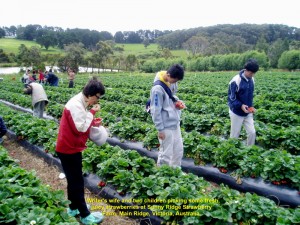
Writer’s wife and two children picking some juicy strawberries at Sunny Ridge Strawberry Farm, Main Ridge, Victoria, Australia
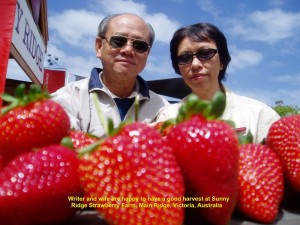
Writer and wife having a good harvest at Sunny Ridge Strawberry Farm, Main Ridge, Victoria, Australia
A Winery
After a visit to the Sunny Ridge strawberry farm we continued our travel to Phillip Island. On the way, we stopped at a winery where we were invited to taste different kinds of wine by the generous winemaker. After tasting the wine, some of us bought a few bottles from her. Outside the winery, we saw neat rows of grape plants which at that time had bunches of bean-sized green fruits.
Rhyll Swamp Bird Sanctuary
To go to Phillip Island, we had to cross a long bridge from San Remo. Arriving on the island, the first place we visited was Rhyll Swamp Bird Sanctuary. At the sanctuary, we saw native birds in aviaries and others in the trees, e.g. kookaburras, parrots and eagles.
Koala Conservation Centre
Next to the bird sanctuary was a koala conservation centre. It has a natural habitat for koalas. To look for the koalas in the trees, we had to walk on raised wooden platforms. It was not difficult to find them. When we found them, we were excited and took some photos of them. Then we left Phillip Island and stopped at a Chinese restaurant at San Remo for dinner. On arrival, we were surprised to see it fully packed with tourists who were mostly Asians. So we waited patiently for an hour before we could enter and have our dinner.
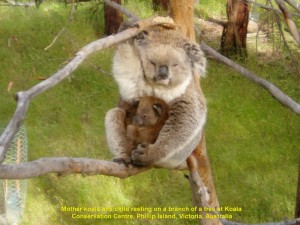
A mother koala and baby resting on a branch at Koala Conservation Centre, Phillip Island, Victoria, Australia
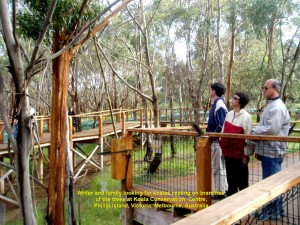
Writer and family looking for koalas in the trees at Koala Conservation Centre, Phillip Island, Victoria, Australia
The Penguin Parade
After dinner, we went back to Phillip Island. When we arrived at Summerland Beach it was getting dark and cold wind was blowing from the sea. The we were awe-struck to see hundreds and thousands of the world’s smallest penguins returning home from fishing in the seas of Bass Strait. They were marching up the beach in groups to their nesting places in the sand dunes. The sight of the penguin parade was spectacular. If they could not find their homes they would try to enter other penguins’ burrows but usually they were chased out noisily by the owners.
I was quite amused by these cute, little creatures which were as big as a duck walking upright like a gentleman in a black and white tuxedos. They would stop walking occasionally to catch their breath before continuing their long walk home.
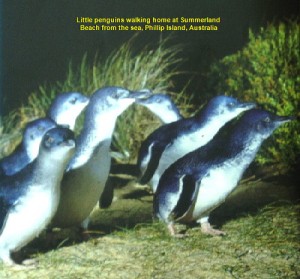
Little penguins returning from the sea and going back to their nests at Summerland Beach, Phillip Island, Victoria, Australia
After watching the amazing penguin parade, we travelled back to our hotel in Melbourne. It took us several hours to reach the city as it is 120 km from Phillip Island.
(Continued in Australia Travel II)

